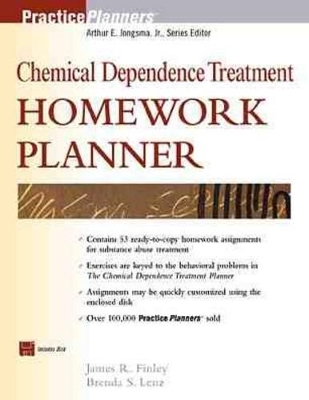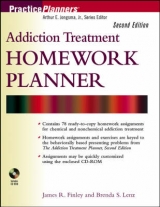
Chemical Dependence Treatment Homework Planner
John Wiley & Sons Inc
978-0-471-32452-2 (ISBN)
- Titel ist leider vergriffen;
keine Neuauflage - Artikel merken
In an era of brief chemical dependence treatment, the time between sessions is an important component of the recovery process. This easy-to-use sourcebook provides pre-written homework assignments for clients with chemical dependence problems. Appropriate for individual or group therapy milieus, as well as inpatient and outpatient settings, the exercises are grouped by behavioral issues and treatment phases.
JAMES R. FINLEY, MA, is a seasoned therapist, educator, and manager, specializing in addictions and group family therapy. With graduate degrees in psychology and education and a BA in management, he is a practicing therapist in a nonprofit setting and coauthor of The Chemical Dependence Treatment Documentation Sourcebook. BRENDA S. LENZ, MS, builds and facilitates therapy programs for adult and adolescent addicts as well as chemically dependent women. A practicing therapist and experienced educator with a graduate degree in counseling, Lenz has taught undergraduate courses on substance abuse and health-related issues for several years. She is coauthor with James Finley of The Chemical Dependence Treatment Documentation Sourcebook.
UNDERSTANDING THE PROBLEM AND ADDRESSING DENIAL. What Does Abuse/Addiction Mean to Me? Problem Identification. Where Am I? Understanding Family History. Identifying Social/Cultural Influences and Pressures to Drink/Use. IDENTIFYING GOALS AND MOTIVATION FOR RECOVERY. What Would My Ideal Life Look Like? What Did I Want to Be When I Grew Up? What Do I Want for My Children? What Price Am I Willing To Pay?: Examining Consequences and Identifying My "Bottom." Making a Yet List: Consequences of Continuing Addictive Lifestyles. IDENTIFYING STRENGTHS, RESOURCES, AND METHODS. What Already Works?: Identifying Proven Problems-Solving Skills and Strenghts. Who Can Help Me?: Identifying and Building My Support Network. What Works for Other People?: Learning from Recovery Role Models. Identifying and Using Community Resources. Using Books, Videos, Audiotapes, and Other Media Resources. PLANNING STRATGEIES AND TAKING ACTION. Meeting My Needs: Alternatives to Substance Use. Using My Support Network. Stress Management. Communication Skills. Taking Care of Myself: Physical and Emotional Self-Care. Personal Recovery Planning. Changing Self-Talk. Setting and Maintaining Boundaries. Working through Shame. MEASURING PROGRESS. How Far Have I Come? Feedback Log: What Do Others See Changing? Understanding and Coping with Post-Acute Withdrawal. Setting and Pursuing Goals in Recovery. PREVENTING RELAPSE. Identifying Relapse Triggers and Cues: Situations and Feelings. Early Warning Signs of Relapse: Red Flags. Putting It All Together: Relapse Prevention Planning. Handling Crisis. Map of Recovery: Planning Aftercare. Taking Daily Inventory. Defense Mechanisms. ADDRESSING OTHER DISORDERS RELATED TO ADDICTION. Dual Diagnosis: Coping with Addiction and Mood Disorders or Bereavement. Dual Diagnosis: Coping with Addiction and Posttraumatic Stress Disorder or Other Anxiety Disorders. Dual Diagnosis: Coping with Addiction and Thought Disorders. Dual Diagnosis: Coping with Addiction and Other Serious Medical Problems. Understanding, Identifying, and Addressing Nonchemical Addictions. Understanding, Identifying, and Addressing Codependent Behaviors. SPECIFIC ASSIGNMENTS FOR WORK WITH TWELVE-STEP PROGRAMS. Twelve-Step Meeting Review/Critique Form. Understanding Spirituality. Step One: Understanding Powerlessness. Step Two: Finding Hope. Step Three: Deciding to Turn It Over. Steps Four and Five: Personal Inventory. Steps Six and Seven: Spiritual and Emotional Change. Steps Eight and Nine: Making Amends. Steps Ten through Twelve: Continued Growth. Finding and Working with a Twelve-Step Sponsor. Finding a Home Group. Balancing My Twelve-Step Program, My Family Life, and My Work Life. Bibliography and Suggested Reading. Quick Cross-Reference Problem/Assignment Guide. About the Disk.
| Erscheint lt. Verlag | 15.7.1999 |
|---|---|
| Reihe/Serie | PracticePlanners |
| Verlagsort | New York |
| Sprache | englisch |
| Maße | 152 x 229 mm |
| Gewicht | 765 g |
| Themenwelt | Medizin / Pharmazie ► Medizinische Fachgebiete ► Suchtkrankheiten |
| Medizin / Pharmazie ► Physiotherapie / Ergotherapie ► Rehabilitation | |
| Sozialwissenschaften ► Soziologie | |
| ISBN-10 | 0-471-32452-3 / 0471324523 |
| ISBN-13 | 978-0-471-32452-2 / 9780471324522 |
| Zustand | Neuware |
| Haben Sie eine Frage zum Produkt? |
